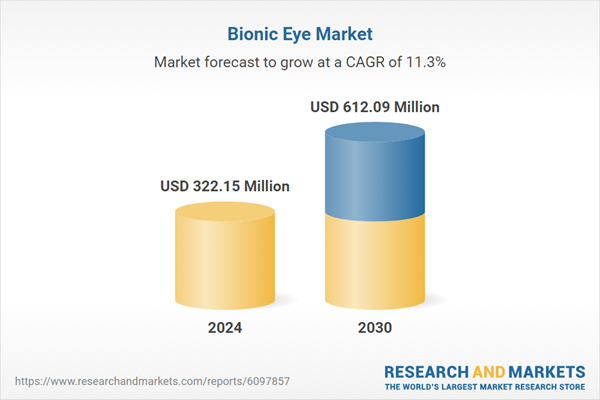Speak directly to the analyst to clarify any post sales queries you may have.
10% Free customizationThis report comes with 10% free customization, enabling you to add data that meets your specific business needs.
Key Market Drivers
Rising Prevalence of Vision Loss and Untreatable Blindness
The increasing incidence of irreversible vision loss due to inherited retinal diseases, age-related macular degeneration (AMD), glaucoma, and optic nerve atrophy is a primary factor fueling demand for bionic eye systems. These conditions frequently progress to stages where existing treatments - such as medications, surgeries, or laser therapies - fail to preserve or restore sight.Globally, more than 1.5 million individuals are affected by hereditary retinal disorders, and approximately 43 million people were estimated to be completely blind in 2020. With aging populations and lifestyle-related health risks such as diabetes on the rise, the global burden of blindness is expected to increase. Bionic eye technologies, including retinal prostheses and neural implants, provide an alternative approach by transmitting visual data directly to the brain or bypassing damaged retinal cells. For patients who no longer respond to conventional therapies, these systems represent a critical solution, filling a treatment void and offering new hope for functional visual recovery.
Key Market Challenges
High Development and Deployment Costs
The complexity of bionic eye systems - requiring cutting-edge microelectronics, neurosensory interfaces, and high-precision surgical procedures - results in substantial development and operational costs. Total treatment costs, including device implantation, patient rehabilitation, and post-operative support, often place the technology beyond the reach of many healthcare providers and patients, particularly in low- and middle-income regions. Limited insurance reimbursement further hinders accessibility. This cost barrier has slowed the pace of adoption and restricted market entry primarily to specialized centers in high-income countries, impeding broader market penetration.Key Market Trends
Advancements in Brain-Machine Interface (BMI) and Neuroprosthetics
A transformative trend in the bionic eye market is the integration of brain-machine interface technologies, which allow direct communication between external image sensors and the visual cortex. This bypasses damaged optic nerves or retinal pathways, enabling potential restoration of higher-order visual functions such as object identification and spatial awareness. Innovations in electrode array design, neural decoding algorithms, and bio-compatible materials are supporting the development of more natural and responsive visual systems. As these advancements gain traction, next-generation bionic eye devices are evolving beyond basic light detection to provide richer, more functional visual experiences - attracting growing interest from researchers, investors, and medical institutions.Key Market Players
- Second Sight Medical Products LLC
- Nidek Co. Ltd.
- Nano Retina Ltd.
- MetaModal LLC
- Biomedical Technologies S.L.
- Bionic Vision Technologies
- Pixium Vision
- Monash Vision Group
Report Scope:
In this report, the Global Bionic Eye Market has been segmented into the following categories, in addition to the industry trends which have also been detailed below:Bionic Eye Market, By Type:
- External Eye
- Implanted Eye
Bionic Eye Market, By End User:
- Hospitals
- Outpatient Facilities
- Research and Manufacturing
Bionic Eye Market, By Region:
- North America
- United States
- Canada
- Mexico
- Europe
- France
- United Kingdom
- Italy
- Germany
- Spain
- Asia-Pacific
- China
- India
- Japan
- Australia
- South Korea
- South America
- Brazil
- Argentina
- Colombia
- Middle East & Africa
- South Africa
- Saudi Arabia
- UAE
Competitive Landscape
Company Profiles: Detailed analysis of the major companies present in the Global Bionic Eye Market.Available Customizations:
With the given market data, the publisher offers customizations according to a company's specific needs. The following customization options are available for the report.Company Information
- Detailed analysis and profiling of additional market players (up to five).
This product will be delivered within 1-3 business days.
Table of Contents
Companies Mentioned
- Second Sight Medical Products LLC
- Nidek Co. Ltd.
- Nano Retina Ltd.
- MetaModal LLC
- Biomedical Technologies S.L.
- Bionic Vision Technologies
- Pixium Vision
- Monash Vision Group
Table Information
| Report Attribute | Details |
|---|---|
| No. of Pages | 182 |
| Published | June 2025 |
| Forecast Period | 2024 - 2030 |
| Estimated Market Value ( USD | $ 322.15 Million |
| Forecasted Market Value ( USD | $ 612.09 Million |
| Compound Annual Growth Rate | 11.2% |
| Regions Covered | Global |
| No. of Companies Mentioned | 8 |









